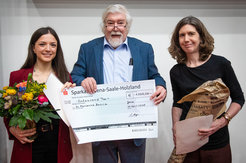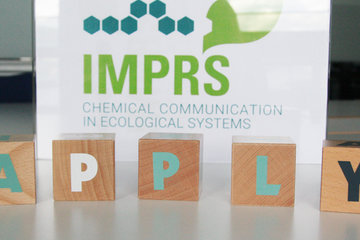Plants as biofactories
Marianna Boccia received the Beutenberg Campus Prize for the best doctoral thesis

On April 3, 2025, the prizes for the best doctoral theses and young researchers were once again awarded at the Beutenberg Campus in Jena.
Marianna Boccia from the Max Planck Institute for Chemical Ecology received this year's prize for the best dissertation on campus. In her PhD thesis, which was supervised by Sarah O'Connor, head of the Department of Natural Product Biosynthesis, she investigated the amazing potential of plants as biofactories for the production of valuable chemical compounds.
The broad range of her research topics should be especially highlighted. In one project, she transformed tobacco plants into miniature chemical laboratories. Using synthetic substrates and natural biosynthetic pathways, she created new-to-nature products that could contribute to the development of new pharmacological agents! In this way, Marianna Boccia impressively demonstrated that plants can be reprogrammed for pharmaceutical research. In another study, she unraveled the secret of saponins, a group of compounds found in solanaceous plants. Saponins help plants defend themselves against pests. Marianna Boccia identified a "scaffold protein" that is crucial for their production. When she genetically engineered plants to lack this protein, they became more vulnerable to herbivores. This is the first clear evidence of the ecological role of saponins. This work has far-reaching implications for basic ecological research, as well as potential applications in agriculture, and has been published in the journal Science. A third project could revolutionize our nutrition: Marianna Boccia modified tomatoes to produce vitamin D, a nutrient essential for our health. Vitamin D in our diet is mainly of animal origin. It is found, for example, in oily fish. Through innovative techniques, including the use of an insect protein, she was able to convert plant cholesterol into vitamin D, paving the way for plant-based vitamin D alternatives with enormous application potential.
"I am honored to receive the Beutenberg Campus Prize for the best thesis. This award motivates me to continue contributing to the advancement of knowledge in my field," said Marianna Boccia. "The challenges of my work were not only the complexity of the research, but also staying motivated through the ups and downs of the scientific process and my personal life. This award highlights the importance of perseverance, curiosity, and collaboration. I would also like to thank my mentors and colleagues, without whom none of this work would have been possible!”
"Marianna Boccia's scientific approach impressively demonstrates the fusion of different scientific disciplines - from mass spectrometry to identify new compounds to the use of biophysical assays and microscopy to understand protein interactions," says Sarah O'Connor. This is in keeping with the motto of Beutenberg Campus motto "Life Sciences Meets Physics".












